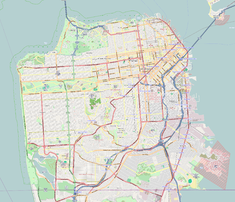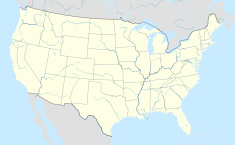Fallon Building
| Fallon Building | |
|---|---|
 | |
| Location | 1800 Market Street, San Francisco, California, 94102, U.S. |
| Coordinates | 37°46′20″N 122°25′26″W / 37.772355°N 122.423938°W |
| Built | 1894 |
| Built for | Carmel Lodge Fallon |
| Architect | Edward D. Goodrich |
| Architectural style(s) | Queen Anne |
| Designated | November 8, 1998[1] |
| Reference no. | 223 |
The Fallon Building, also known as the Carmel Fallon Building, is a historic mixed-use building built in 1894 and located in the Castro District of San Francisco, California.[2][3] It is the home of the San Francisco LGBT Center since 2002.[4]
The building has been listed as a San Francisco Designated Landmark since November 8, 1998.[1][5][6]
History
[edit]
The Fallon Building is located at an intersection corner at 1800 Market Street in San Francisco.[7] The three-story, 6,000-square-foot building was designed by architect, Edward D. Goodrich in a Queen Anne style.[8][7]
The structure was built in 1894 for Carmel Lodge Fallon (she has many variations of name, also known as Maria del Carmen Juana Josefa Cota Fallon, Martina Castro Fallon, or Carmelita Castro Fallon), a Californio entrepreneur and landowner, she had inherited land in the area of Soquel.[3][9][10] She was divorced from Thomas Fallon, a United States Army Commander that had conquered the city of San Jose for the United States in 1846, and he later served as the mayor of the city.[11][12] Fallon was also the niece of José Antonio Castro, the last Mexican Governor of Alta California; and the namesake of the Castro District and Castro Street.[11][13]
In December 1996, the San Francisco LGBT Community Center purchased the building.[12] The Fallon Building had been subject to decades long debates on architecture preservation, and subject to many remodels.[12][4] The group, "Friends of 1800 Market Street" was formed by Jim Siegel and others, named after the address of the Fallon Building with the mission of preserving the architectural heritage of San Francisco, among other things.[3]
References
[edit]- ^ a b "City of San Francisco Designated Landmarks" (PDF). City of San Francisco. Retrieved 2022-11-24.
- ^ Curtius, Mary (1999-02-17). "A City Torn Between Past and Present". The Los Angeles Times. p. 1. ISSN 0458-3035. Retrieved 2022-11-25.
- ^ a b c Curtius, Mary (1999-02-17). "A City Torn Between Past and Present; History: Building Preservation Battles in San Francisco". The Los Angeles Times. p. 13. ISSN 0458-3035. Retrieved 2022-11-25.
- ^ a b Bajko, Matthew S. (September 6, 2015). "SF LGBT Center Plans Remodel". Bay Area Reporter. Retrieved 2022-11-26.
- ^ "San Francisco Landmark #223: Carmel Fallon Building". noehill.com. Retrieved 2022-11-25.
- ^ Lewis, Gregory (1998-10-10). "Fallon Building now city landmark". The San Francisco Examiner. p. 8. ISSN 2574-593X. Retrieved 2022-11-25.
- ^ a b Levy, Dan (July 16, 1998). "Landmark Status Puts Gay Center Closer to Reality". San Francisco Chronicle. ISSN 1932-8672. Retrieved 2022-11-26.
- ^ Cerny, Susan Dinkelspiel (2007). An Architectural Guidebook to San Francisco and the Bay Area. Gibbs Smith. p. 67. ISBN 978-1-58685-432-4.
- ^ Michelson, Alan. "Fallon, Carmel Building, San Francisco, CA". Pacific Coast Architecture Database (PCAD). University of Washington. Retrieved 2022-11-25.
- ^ Powell, Ronald (2019). The Castros of Soquel (PDF). Stanley D. Stevens (introduction). pp. 9, 12.
- ^ a b "The story behind the new names for two historic sites in San Jose". The Mercury News. 2021-11-04. ISSN 0747-2099. Retrieved 2022-11-25.
- ^ a b c Levy, Dan (November 12, 1997). "Planned Razing of Victorian House Raises Battle Cry in Castro". SFGate. Retrieved 2022-11-27.
- ^ Martinez, Linda Castro (2021-07-15). Encarnación Castro’s Journey In The Anza Expedition 1775-1776: And the Founding of San Francisco and San Jose, California. Covenant Books, Inc. p. 198. ISBN 978-1-63630-580-6.



